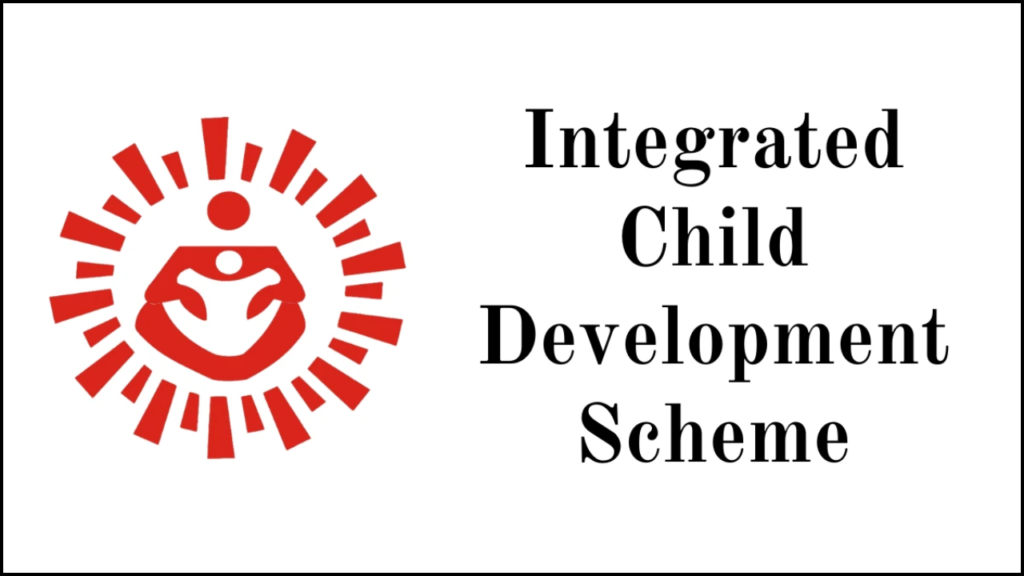
The ICDS is an Indian government-started program to help children and women. This program improves the health and nutrition of children under the age of 06 and their mothers. This social welfare program plays a crucial role in addressing malnutrition and child development through various schemes and services. It is one of the largest initiatives in the world dedicated to the well-being of young children and women.
Schemes Under ICDS
There are various schemes under the ICDS program, check below.
1. Anganwadi Services Scheme
The govt has started this scheme to help the children in their early childhood. This scheme helps children below age 06, women who are pregnant, and lactating mothers. The six key services under this scheme include:
- Supplementary Nutrition: This includes Home Ration (THR), hot cooked meals, and morning snacks, which are essential for improving the nutritional status of vulnerable households.
- Pre-school Non-formal Education: Early education is provided to prepare children for formal schooling.
- Nutrition and Health Education: Mothers and caregivers are educated on nutrition and health practices.
- Immunization: This scheme provides vaccination services to the children.
- Health Check-ups: There are health checkups at regular intervals of time.
2. Pradhan Mantri Matru Vandana Yojana
The Indian Govt has started this scheme to provide the financial benefit to mothers who are feeding their infants. The month will be transferred to their bank accounts. The govt will provide a total amount of Rs 5000 in the bank accounts of mothers in three installments.
3. National Creche Scheme
The govt has started this scheme for mothers who have children below the age of 06 years and those mothers who are working. The mothers can leave their child in the Creche while they go for the job. The key features of this scheme include:
- Day-care services for 7.5 hours a day, 26 days a month.
- Provision of supplementary nutrition, early childcare education, and medical check-ups.
- Sleeping arrangements for children to ensure their well-being.
4. Scheme for Adolescent Girls
This scheme focuses on out-of-school girls aged 11-14 years, aiming to improve their nutrition, life skills, and social status. The scheme provides:
- Nutritional support, including iron and folic acid supplementation.
- Health check-ups and referral services.
- Education on nutrition, health, and home management.
- Skill training and bridge courses to help girls re-enter formal education or gain employment.
- Counseling on accessing public services.
5. Child Protection Scheme
This initiative aims to protect children from difficult situations such as abuse, neglect, exploitation, and abandonment. The scheme helps children by providing:
- Shelter and rehabilitation services.
- Legal aid and psychological support.
- Integration of vulnerable children back into society.
6. POSHAN Abhiyaan
POSHAN Abhiyaan is a national nutrition mission that targets stunting, undernutrition, anemia, and low birth weight among children, adolescent girls, pregnant women, and lactating mothers. The program focuses on:
- Reducing malnutrition and undernutrition rates.
- Promoting dietary diversity and balanced nutrition.
- Strengthening the capacity of Anganwadi workers to provide better services.
Major Objectives of ICDS
The objectives of the ICDS scheme are given below.
- The scheme mainly focuses on the health of children aged 0-6 years.
- Lay the foundation for the psychological, physical, and social development of children.
- Reduce mortality in the child and mother.
- Enhance mothers’ ability to care for their children’s nutritional and health needs.
- Empower adolescent girls by providing education, skill development, and self-reliance opportunities.
Other Similar Government Schemes
Apart from ICDS, several other government programs focus on child and maternal welfare:
1. National Health Mission (NHM)
Launched in 2013, the NHM integrates the National Rural Health Mission (NRHM) and the National Urban Health Mission (NUHM) under the Ministry of Health & Family Welfare.
- Reproductive, Maternal, Neonatal, Child, and Adolescent Health.
- Management of communicable and non-communicable diseases.
- Strengthening healthcare services in rural and urban areas.
2. Mid-Day Meal Scheme
Initiated in 1995, the Mid-Day Meal Scheme ensures that children in classes I to VIII receive a nutritious hot cooked meal every school day. This scheme aims to:
- Encourage school enrollment and reduce dropout rates.
- Improve the nutritional levels of school-going children.
- Enhance cognitive and learning abilities.
3. National Nutrition Strategy
The National Nutrition Strategy was launched by NITI Aayog to eliminate all forms of undernutrition by 2030. This initiative supports:
- The Sustainable Development Goals (SDGs) related to nutrition and health.
- Strategies to improve maternal and child nutrition.
- Collaboration between government and non-government agencies for better outcomes.
Conclusion
The ICDS program plays a pivotal role in ensuring the well-being of children and mothers in India. By offering essential services such as nutrition, health care, education, and skill development, ICDS is instrumental in fostering a healthier and more educated future generation.
FAQs
Q1. Who is eligible for ICDS services?
A1. The ICDS program benefits children aged 0-6 years, pregnant women, lactating mothers, and adolescent girls. Services are provided through Anganwadi centers across the country.
Q2. How can a pregnant woman avail of benefits under PMMVY?
A2. A pregnant woman can apply for PMMVY benefits through Anganwadi centers, government health facilities, or online portals.